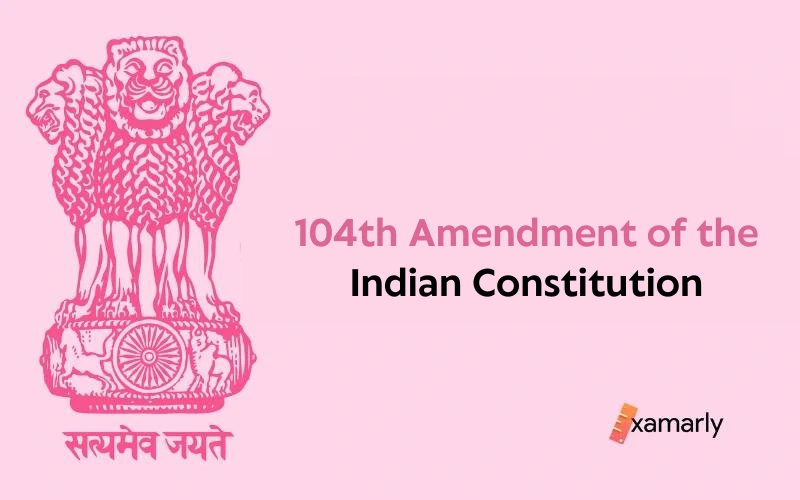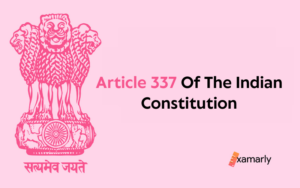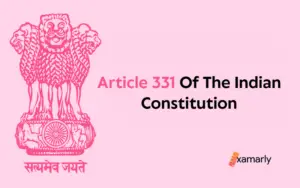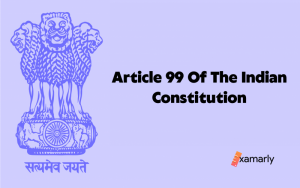The 104th Amendment Of the Indian Constitution came into force on 25th January 2020. It extended the period within which the seats reserved for Scheduled Castes and Scheduled Tribes will be phased out.
It also eliminated the provision for Anglo-Indians to have reserved seats. In this blog, we have curated important information about the 104th Amendment of the Indian constitution exclusively for UPSC aspirants.
If you are preparing for the UPSC examination, grab a notebook and take notes!
- What are Constitutional Amendments in India?
- Background – 104th Amendment of the Indian constitution
- Salient Features and Facts
- Date Enacted
- Statement of Objects and Reasons
- Important Provisions
- Summing Up
- Frequently Asked Questions
- What is the purpose of the 104th Amendment of the Indian constitution?
- When was the 104th Amendment of the Indian constitution Act passed?
- Why 104th Amendment of the Indian constitution is important?
- What are the benefits of the 104th Amendment of the Indian constitution?
- Who are considered socially and educationally backward classes under the 104th Amendment of the Indian constitution?
- Does the 104th Amendment of the Indian constitution affect the reservation policy for women?
- What is the duration of the extension of reservations under the 104th Amendment Act?
- How does the 104th Act impact educational institutions?
- Does the 104th Amendment Act affect private institutions as well?
- Does the 104th Amendment Act affect private institutions as well?
- Can the provisions of the 104th Amendment Act be challenged in court?
What are Constitutional Amendments in India?
Constitutional amendments in India are changes made to the Indian Constitution. They can either add or remove provisions from the Constitution.
The process is outlined in Article 368 of the Constitution and requires a two-thirds majority vote in both Houses of Parliament, followed by the President’s approval. The Constitution has been amended 104 times as of 2021.
Similar Posts:
- 105th Amendment of the Indian Constitution
- 50th Amendment of the Indian Constitution
- 69th Amendment of the Indian Constitution
Background – 104th Amendment of the Indian constitution
- The British Prime Minister Ramsay Macdonald presented the “Communal Award” in 1933.
- This instituted the reservation system that is presently still in effect.
- Following independence, the leaders of the country instituted the reservation system, which was initially only applicable to members of the Scheduled Castes (SCs) and Scheduled Tribes (STs).
- Leaders The Anglo-Indian community, Scheduled Classes, and Scheduled Tribes were granted legislative quotas of seats under Article 334 of the Indian Constitution from 1950 to 1960 i.e. for ten years.
- The period of reservation was increased by subsequent acts.45th CAA 1980 – Extended seats up to 26th January 199062nd CAA – Extension of Reservation of seats up to 26th January 200079th CAA – Extended the Reservation of seats up to 26th January 201095th CAA – Extended the Reservation of seats up to 26th January 2020
Salient Features and Facts
- This Act scrapped the Anglo-Indian community’s nomination-based representation in the Lok Sabha and state Legislative Assemblies. It also amended Article 334 of the Indian constitution to provide an extension to Scheduled Castes and Scheduled Tribes in the Parliament of India and State legislatures.
- The term of reservations for SCs and Scheduled Tribes was extended for ten years.
- The term Anglo Indian is related to a person who is an Indian native but whose father or any other male progenitors in the male line are or were of European descent. It originates from the East India company’s policy of encouragement of local marriages.
- The aforementioned reservation was provided for temporary purposes to increase political participation and other benefits. It was to provide Anglo-Indian representation in proportion to the Anglo-Indian population in Lok Sabha and state Legislative Assemblies. It showed the inclusive character of the Indian Constitution.
- Indian population over time increased and the population figures of the Anglo-Indian Community declined. Figures released by All-India Anglo-Indian Association showed that there were only 9 Anglo-Indian citizens in West Bengal.
Date Enacted
The 104th Amendment of the Indian constitution Act was passed on:
25th January 2020.
Related – 82nd Amendment Of Indian Constitution
Statement of Objects and Reasons
Even though the Scheduled Castes and Scheduled Tribes have advanced considerably over the past 70 years, the circumstances that drove the Constituent Assembly to establish the aforementioned seat reservation still exist.
To uphold the Constitution’s original aim of being inclusive, a proposed act was put forth.
Important Provisions
- Article 334 was amended to extend the period of reservation in the legislature for SCs and Scheduled Tribes from seventy to eighty years i.e. for ten years till 26th January 2030.
- Special representation and provision for Anglo-Indian reservation in Lok Sabha and state legislative assemblies were deleted.
Summing Up
The cessation of reservation of the Anglo-Indian group in Lok Sabha and state Legislative Assemblies is a debated topic. BJP-led government has scrapped it stating appropriate representation of the community is achieved.
Other than this policy or the rule of reservation for SCs and Scheduled Tribes has always been a bone of contention. Special Protection provided, reservations in legislature granted to them, etc are hot topics for debates.
Frequently Asked Questions
What is the purpose of the 104th Amendment of the Indian constitution?
This Amendment of the Indian Constitution pertains to the extension of reservations for socially and educationally backward classes in educational institutions and public employment.
When was the 104th Amendment of the Indian constitution Act passed?
The 104th Amendment Act was passed on:
25th January 2020.
Why 104th Amendment of the Indian constitution is important?
The Act extends the reservation for socially and educationally backward classes in educational institutions and public employment until 2030.
What are the benefits of the 104th Amendment of the Indian constitution?
The Act ensures that individuals from socially and educationally backward classes have equal opportunities for education and public employment, thereby promoting social and economic equality.
Who are considered socially and educationally backward classes under the 104th Amendment of the Indian constitution?
The socially and educationally backward classes under the Act include Scheduled Castes, Scheduled Tribes, and Other Backward Classes.
Does the 104th Amendment of the Indian constitution affect the reservation policy for women?
The 104th Amendment of the Indian constitution does not affect the reservation policy for women, which is implemented separately.
What is the duration of the extension of reservations under the 104th Amendment Act?
The extension of reservations under the 104th Amendment Act is valid for ten years, until 2030.
How does the 104th Act impact educational institutions?
The 104th Amendment Act mandates the reservation of seats in educational institutions for socially and educationally backward classes, providing them with opportunities for higher education.
Does the 104th Amendment Act affect private institutions as well?
The 104th Act does not apply to private educational institutions, but private employers may voluntarily choose to implement reservation policies.
Does the 104th Amendment Act affect private institutions as well?
The 104th Act does not apply to private educational institutions, but private employers may voluntarily choose to implement reservation policies.
Can the provisions of the 104th Amendment Act be challenged in court?
The provisions of the 104th Act can be challenged in court if they violate the fundamental rights guaranteed by the Constitution.






